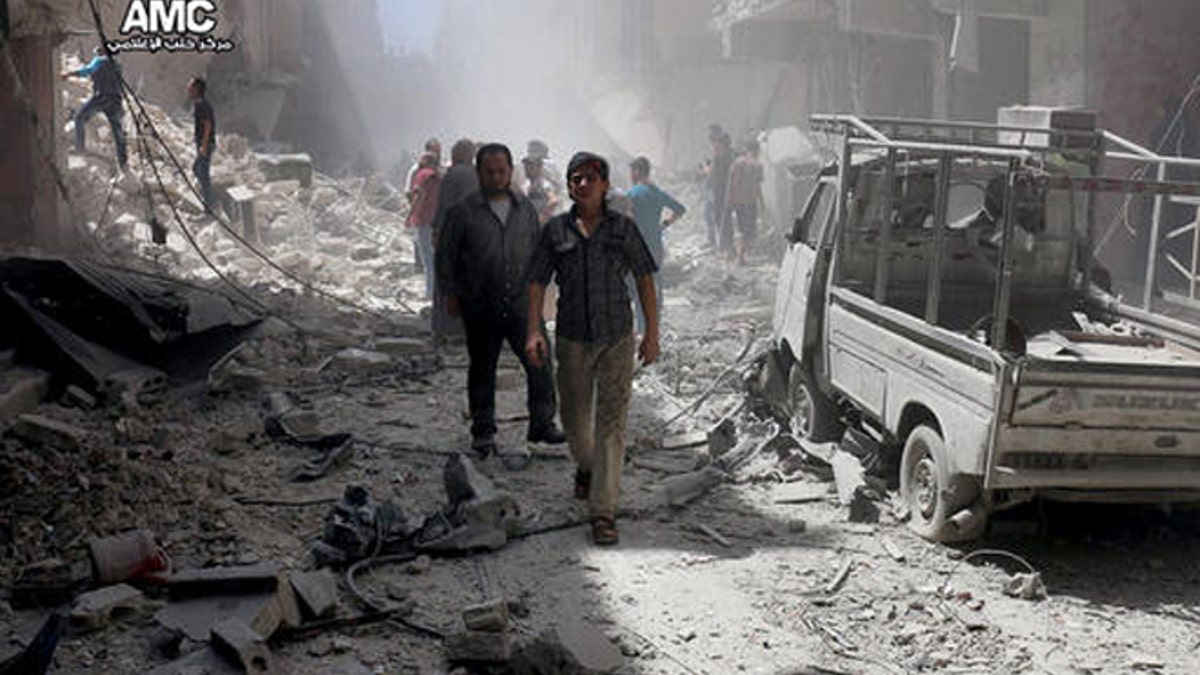
In this Tuesday, July. 26, 2016 file photo, provided by the Syrian anti-government activist group Aleppo Media Center (AMC), shows Syrian citizens inspect damaged buildings after airstrikes hit Aleppo, Syria. Fierce fighting and airstrikes continue in Syria's northern city of Aleppo as insurgents try to break a siege on opposition-held eastern districts in a counteroffensive to government advances. But Syria's war, now in its sixth year, is raging beyond Aleppo, claiming dozens of lives every day. (Aleppo Media Center via AP, File)
BEIRUT – Rebels breached the Syrian government siege on opposition neighborhoods in the city of Aleppo, opening a corridor in the south and marking a major military breakthrough. The push prompted an intensive airstrike campaign Sunday as insurgent groups put up a massive defense to protect the new corridor and gain new ground.
The battle for Aleppo, Syria's largest city and former commercial heart, is pivotal for the Syrian civil war. It is not clear whether the rebels would be able to keep their new gains, but the breach causes a dent in the Syrian government's new confidence and territorial expansion, bolstered by Russian air support.
In a major offensive Saturday, an alliance of over two dozen rebel groups pushed government forces and allied fighters out of parts of the southern Ramouseh district, including from a number of military colleges, a bakery, a post office, a parking lot and a section of the highway.
The rebels hailed the breach as a major collaborative achievement a week after launching their counteroffensive. Fighters besieged in the city coordinated with the Army of Conquest alliance, which includes the Levant Conquest Front, the rebranded al-Qaida branch in Syria, based in neighboring Idlib province. The Levant Conquest Front had announced it was breaking ties with the global terror network a week earlier, citing as a motive the desire to improve coordination with local rebel groups.
The media arm of Lebanon's Hezbollah, the Shiite militant group fighting alongside the Syrian government, conceded the rebels' advance, adding that airstrikes leveled one of the military colleges after forces withdrew. Syrian State news agency SANA denied the siege was broken and said the government had declared that operations were still ongoing in the area. It said warplanes targeted rebel vehicles and locations in the area Sunday.
The Levant Conquest Front posted pictures of loot from one of the military academies, the artillery school, including armored vehicles and ammunition.
"The turning point was the fall of the artillery school," said Islam Alloush, spokesman for the Jaysh al-Islam rebel group and a former Syrian army officer, who said artillery was always viewed as "god of war" in the military. Alloush said the rebel groups put in massive efforts and ammunition into the battle, adding that his group— which is strongest near Damascus— had mobilized fighters from five neighboring provinces to take part.
He said it is expected the government and allied troops will fight back, but added rebels will protect their hold on the strategic corridor which would allow for a new lifeline for the rebel-controlled part ofAleppo, in the east and north.
Another rebel commander, Hossam Abu Bakr from Ahrar al-Sham, a major faction in the Army of Conquest alliance, said his fighters are working to secure the corridor by expanding their hold.
"The worst method the regime uses is not chemical weapons but it is the sieges, the slow death," Abu Bakr said, speaking via Skype from the frontline. "We will not allow the repeat of the tragedy of sieges imposed elsewhere in Syria."
The U.N. says there are about 18 besieged and hard-to-reach areas, almost all encircled by government forces. Last month, the Syrian government seized the Castillo road, the only route into rebel-held areas in Aleppo. The U.N. said 300,000 people were trapped inside, making eastern Aleppo one of the largest besieged areas in Syria. The government and major ally Russia had offered safe corridors for residents to leave rebel-held areas, an offer met with skepticism from the locals who viewed it as an attempt to depopulate the area.
The rebel advance in the Ramouseh district now threatens a major highway linking the government-controlled part of Aleppo to the outside world, leaving an estimated population of 1.2 million at risk of losing a supply line. The Castillo road remains under government control but activists say it regularly comes under fire.
Rami Abdurrahman, head of the Britain-based Syrian Observatory for Human Rights, said food prices in government-held parts of Aleppo have already gone up. He said some 700 fighters from the government and the insurgent side were killed in the week of fighting. State news agency SANA said one girl was killed in rebel shelling of government areas near the frontline.
A doctor in rebel-held Aleppo, Farida, who declined to give her last name out of concern for the safety of her family in government held-areas, said an intense bombing campaign is taking place inside the city. She said there were reports that one truck carrying vegetables had entered the besieged area, but said she had not seen it, suspecting the vegetables were quickly sold. She said residents have a great need for basic commodities and fuel.




















